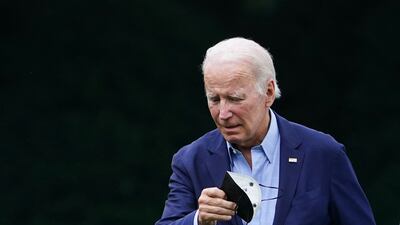US President Joe Biden's administration is expected to respond by Wednesday to Iran’s latest offer to resume its compliance with the 2015 Iran nuclear deal, but neither side is offering a definitive path to revive the agreement.
Officials in Washington told the Associated Press that, following a week and a half of deliberations, the US response to Iran’s comments on a European draft proposal will be ready by August 24, after which another round of negotiations in Vienna to finalise the details of a potential deal will probably be needed.
Despite the forward movement, numerous hurdles remain. And key sticking points could still unravel efforts to bring back the 2015 deal.
Even US supporters of an agreement are no longer referring to the “longer and stronger” deal that they had initially set out to win when indirect negotiations with Iran began last spring.
And on the Iranian side, demands for greater US sanctions relief than the administration appears willing or able to promise could undercut the push to revive the agreement.
In Washington, the Biden administration faces considerable political opposition to returning to the deal from both Democrats and Republicans in Congress who remain unconvinced that it aligns with US national security interests.
The recent indictment of an Iranian for plotting to murder former president Donald Trump's national security adviser John Bolton and the attack by an apparent Iran sympathiser on author Salman Rushdie have further contributed to doubts that Tehran can be trusted.
The latest draft does not include Iran's demand that the US lift the terrorism designation of the Islamic Revolutionary Guards Corps, and Tehran has stepped back from a demand that the International Atomic Energy Agency close its investigation into unexplained traces of uranium at three undeclared sites, said a senior administration official who requested anonymity to discuss continuing efforts to resurrect the deal.

And while Iran may have agreed to a mechanism to eventually return to the deal without the IAEA investigation being closed up front, it has said that its actual compliance with an agreement remains contingent on getting a clean bill of health from the agency.
The senior administration official said a “deal is closer than it was two weeks ago”, but cautioned that the outcome remains uncertain “as some gaps remain”.
Iranian officials on Tuesday bristled at the suggestion that they’ve stepped back from their demands to re-enter the deal.
Meanwhile, Israel has become increasingly alarmed at the apparent movement towards a deal. Israel’s alternate prime minister Naftali Bennett on Tuesday called on the Biden administration to resist forging ahead with a deal with the Iranians.
“I call on President Biden and the American administration to refrain, even now at this last minute, from signing the agreement with Iran,” Mr Bennett said in a statement.
“One way or another, the state of Israel is not a party to the agreement. Israel is not committed to any of the restrictions stemming from the agreement and will utilise all available tools to prevent the Iranian nuclear programme from advancing.”
Since Iran submitted its final proposal to the EU, the Biden administration has engaged in internal consultations within the different government agencies as well as with international partners to determine its response.
Included in the consultations was Israel, which remains opposed to the deal, and whose national security adviser, Eyal Hulata, is visiting Washington this week. The US also consulted with Gulf and Asian partners.
On Tuesday, Wendy Sherman, deputy secretary of state, who played a central role in negotiating the 2015 agreement, met Chinese ambassador to the US Qin Gang as well as EU Head of Cabinet Frederic Bernard. Ms Sherman met Mr Hulata on Monday.
The White House insists that the terms under discussion include the key underpinnings of the 2015 deal, namely that the US would lift hundreds of sanctions the Trump administration reimposed when it withdrew from the deal in 2018, and Iran would roll back its nuclear programme to the limits set by the original agreement.
However, it remains unclear what exactly would happen to Iran's current stockpile of highly enriched uranium and what it would be required to do with the advanced centrifuges it has been using. The White House has said both would be “removed” but has not offered details.
As of the last public count, Iran has a stockpile of some 3,800 kilograms of enriched uranium. Under the deal, Tehran could enrich uranium to 3.67 per cent purity, while maintaining a stockpile of uranium of 300kg under constant scrutiny of surveillance cameras and international inspectors.
The Associated Press contributed to this report

